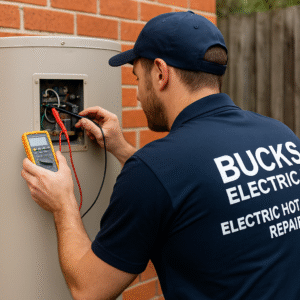Electrical systems are the backbone of every home. From powering appliances to ensuring lighting and heating systems work efficiently, your home’s electrical infrastructure must be installed, maintained, and repaired by a skilled professional. Choosing the right residential electrician is crucial to ensure safety, reliability, and quality workmanship.
In this blog, we’ll explore the key tips for selecting a qualified residential electrician, what qualifications to look for, and how hiring the right professional can save time, money, and stress.
Why Hiring the Right Residential Electrician Matters
Electrical work is not a DIY task. Incorrect installations or repairs can lead to:
-
Electrical fires
-
Damage to appliances and electronics
-
Code violations and fines
-
Potential injury or fatal accidents
A certified and experienced residential electrician brings expertise, ensures compliance with local codes, and guarantees that the work is done safely and efficiently. Choosing the wrong professional can result in costly mistakes, legal issues, and long-term problems in your home.
Tip 1: Check Licensing and Certifications
The first step in choosing a residential electrician is verifying their licensing and certifications. Licensing ensures that the electrician has completed required training, passed examinations, and meets local or state regulations.
What to look for:
-
Valid electrician license issued by the state or local authority
-
Specialty certifications, if needed (e.g., home automation, solar systems)
-
Proof of insurance and bonding to cover damages or accidents
A licensed and certified electrician demonstrates professionalism and is legally qualified to perform electrical work in your home.
Tip 2: Assess Experience and Expertise
Experience matters significantly in electrical work. A residential electrician with years of hands-on experience is better equipped to handle complex problems and unexpected challenges.
Key questions to ask:
-
How many years have you been working as a residential electrician?
-
Have you handled projects similar to mine before?
-
Do you specialize in certain types of electrical systems or upgrades?
An experienced residential electrician will provide solutions efficiently, reducing the risk of errors and ensuring long-lasting results.
Tip 3: Read Reviews and Check References
Reviews and references provide insight into the reliability and quality of a residential electrician. Satisfied clients often share their experiences regarding:
-
Punctuality and professionalism
-
Quality of work and adherence to safety standards
-
Responsiveness to questions and concerns
-
Pricing transparency
Ask for references from past clients and, if possible, visit completed projects to assess workmanship. Online reviews on platforms like Google, Yelp, or Angie’s List can also help gauge the electrician’s reputation.
Tip 4: Evaluate Services Offered
Different residential electricians may specialize in specific areas. Ensure the professional you choose offers the services your home requires. Typical services include:
-
Electrical repairs and troubleshooting
-
Wiring and panel upgrades
-
Lighting installation and design
-
Appliance wiring and outlet installation
-
Smart home system integration
Choosing a residential electrician who offers comprehensive services ensures that you won’t need to hire multiple professionals for different tasks.
Tip 5: Verify Insurance and Warranty
Insurance is critical when hiring a residential electrician. Accidents can happen, and without proper coverage, you may be liable for injuries or damages.
Check for:
-
General liability insurance
-
Workers’ compensation coverage
-
Warranties on work performed, guaranteeing repairs or installations
A reputable residential electrician will carry insurance and provide warranties, giving you peace of mind that the work is protected.
Tip 6: Get Multiple Quotes
Before hiring, request quotes from several residential electricians. Comparing quotes allows you to:
-
Understand average market pricing
-
Identify hidden fees or unnecessary add-ons
-
Assess transparency and professionalism in communication
While cost is important, it should not be the sole deciding factor. The lowest price may not always equate to the highest quality or safest work.
Tip 7: Communication and Professionalism
A residential electrician should be approachable, communicative, and professional. Good communication ensures that you understand the work being done and can ask questions without hesitation.
Indicators of professionalism:
-
Clear explanations of the work required
-
Timely responses to calls or emails
-
Respect for your property, including cleanup after work
-
Providing written estimates and contracts
Strong communication skills also indicate reliability and respect for client needs.
Tip 8: Consider Emergency Services
Electrical emergencies can happen at any time, from power outages to short circuits or exposed wiring. Hiring a residential electrician who offers 24/7 emergency services ensures that you can get help when you need it most.
Questions to ask:
-
Do you provide emergency or after-hours services?
-
What is the typical response time in case of urgent electrical issues?
Having a trusted residential electrician on call can prevent small problems from turning into dangerous or costly situations.
Tip 9: Look for Continuing Education and Updated Skills
The electrical industry evolves with new technologies, energy-efficient solutions, and smart home systems. A residential electrician who pursues continuing education and stays current with industry trends brings modern solutions and best practices to your home.
Examples of updated skills:
-
Knowledge of energy-efficient lighting and appliances
-
Smart home system installation and integration
-
Solar panel installation and renewable energy solutions
Hiring a skilled, up-to-date residential electrician ensures your home benefits from the latest technology and safety practices.
Tip 10: Trust Your Instincts
Finally, trust your instincts when choosing a residential electrician. If something feels off about their communication, professionalism, or transparency, it may be wise to look for another professional.
Choosing an electrician is not just about qualifications and pricing—it’s also about trust, comfort, and confidence in their ability to handle your home’s electrical systems safely.
Red Flags to Avoid
When evaluating residential electricians, watch out for the following warning signs:
-
Lack of proper licensing or insurance
-
Refusal to provide references or quotes
-
Poor communication or unprofessional behavior
-
Extremely low pricing compared to industry standards
-
Limited experience with residential electrical work
Avoiding these red flags can prevent costly mistakes and ensure a positive experience.
Benefits of Hiring the Right Residential Electrician
Hiring a qualified residential electrician provides several advantages:
-
Safety: Properly installed and maintained electrical systems reduce fire and shock risks.
-
Efficiency: Skilled electricians complete tasks correctly and efficiently, saving time and money.
-
Code Compliance: Ensures your electrical systems meet local regulations, avoiding fines or future issues.
-
Peace of Mind: Knowing your home’s electrical work is handled by a professional reduces stress and worry.
Conclusion
Choosing the right residential electrician is a critical decision for any homeowner. From licensing and experience to reviews, communication, and updated skills, each factor plays a role in ensuring safe, efficient, and reliable electrical work.
By taking the time to research, compare, and verify credentials, you can select a residential electrician who meets your needs, provides high-quality service, and keeps your home safe and functional. For trusted expertise and professional electrical services, partnering with Madison Electric Company ensures that your home’s electrical systems are in the hands of certified, experienced, and reliable professionals.




